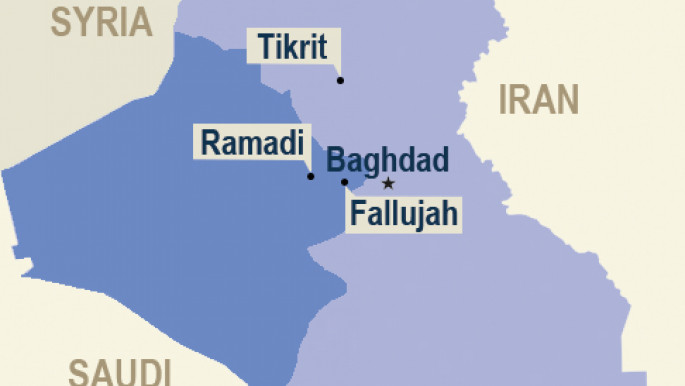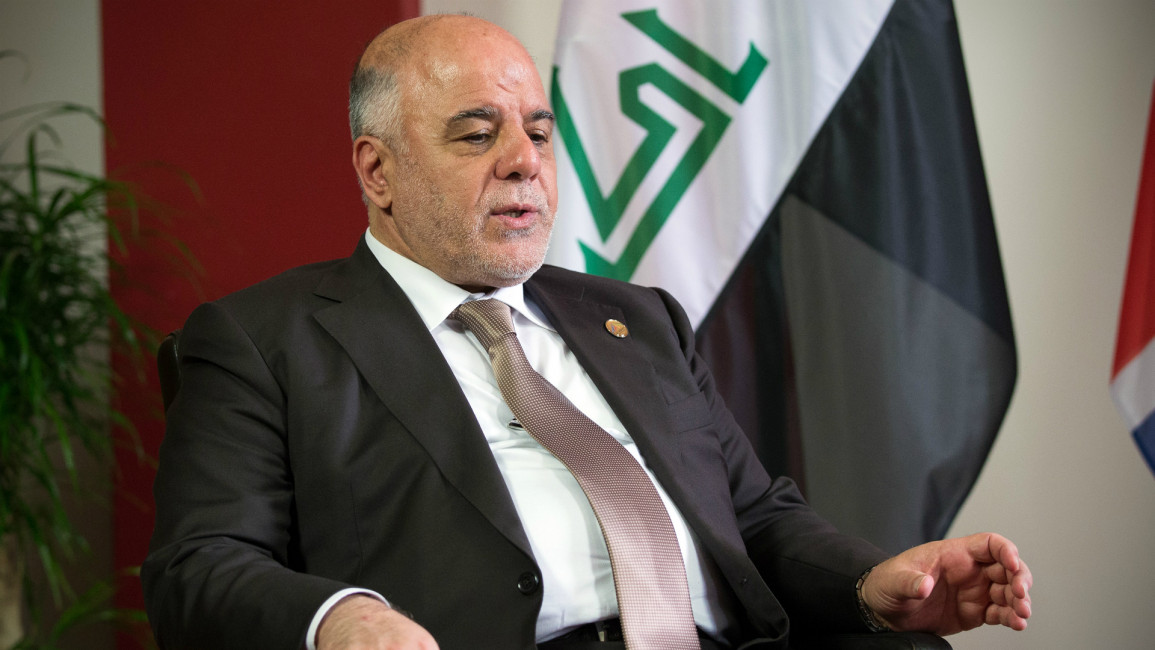Iraqi PM's allies planning coup, says Sunni Alliance
Iraqi PM's allies planning coup, says Sunni Alliance
The Iraqi Forces Alliance claims it has rejected an effort to topple Prime Minister Haider al-Abadi, as efforts to close in on the Anbar provincial capital seized by extremists intensify.
4 min read
Iraqi Prime Minister Haider al-Abadi is under pressure to implement promised reforms [Getty]
The Iraqi Forces Alliance, known as the Sunni Alliance, has claimed that political blocs allied to Prime Minister Haider al-Abadi are discussing plans to topple the government.
The Sunni Alliance refused to join such talks, its leaders said.
Abadi's foes are thought to be from within his own National Aliiance coalition and include senior political figures who are seeking to seize power.
"Political forces from the ruling National Alliance, particularly the State of Law bloc and senior figures in the National Alliance, are conducting talks to unseat Abadi from his position, because he accused prominent [political] figures of wasting public money," said Dhafer al-Ani, an MP from the Sunni Alliance.
Al-Ani said that these factions were accusing Abadi of "monopolising decisions related to reforms" and that these "reforms have not yet touched on the core of the problem".
He added that they were also criticising the "slow pace of military action [against IS] and not making any achievements in this regard", and said there had been "no improvement in the services sector".
Al-Ani said that the dissenting factions had called on the Sunni Alliance to join them, but they had so far refused to be part of such a move, stressing that "it is early to think about changing the government".
Al-Ani also called for Abadi to be given more time to implement the promised reforms, pointing out that the prime minister "is not solely responsible for implementing reforms".
Kurdistan Alliance member Qasim Ahmad, meanwhile, told al-Araby: "The reform package that was launched by Abadi has put him in big trouble, although most of it has not been implemented."
Ahmad said that Abadi made himself responsible for fulfilling the promised reforms but "was not able to achieve these promises and cannot withdraw from them".
This situation gave Abadi's foes a chance to topple him, said Ahmad.
"Abadi's foes are certainly from inside the coalition that he belongs to, because the [National] Alliance is the side that has the right to form the government - being the largest bloc in parliament - a matter that is raising the ambitions of the bloc's leaders who are trying to seize power," Ahmad explained.
Ahmad stressed that the Kurdish political factions were not party to this plan and wish to grant Abadi sufficient time to achieve his reforms.
He also warned that the National Alliance was experiencing an "internal crisis," and that their "schemes may cost Iraq a lot, because of their power disputes".
Iraq forces retake areas around Ramadi
Meanwhile, Iraqi forces have retaken several areas north and west of Ramadi as efforts to close in on the Anbar provincial capital seized by extremists in May intensify, officials said Wednesday.
An operation involving 2,000 troops backed by airstrikes from the US-led coalition led to the recapture of several neighbourhoods from the Islamic State group [IS].
A brigadier general from the Anbar operations command said those included Zankura, Albu Jleib, Al-Adnaniyah and parts of Albu Risha and an area known as Kilometre 5.
"The Iraqi security forces also took control of the main road west of Ramadi and they are now using it to support the forces positioned to liberate Ramadi," Adhal Fahdawi, a member of the provincial council, told AFP.
According to the US-led coalition's daily tally of airstrikes in Iraq and Syria, a total of 27 strikes have been conducted in the Ramadi area since the start of October.
"The coalition's air support has played a big part in this progress," Fahdawi said. "If operations continue at this pace, I expect the liberation of Ramadi to be possible by the end of the month."
Ahmed al-Assadi, spokesman for the Hashed al-Shaabi paramilitary organisation also involved in the operation, even predicted it would happen "in the next few days".
Iraqi officials, including Assadi and Prime Minister Haider al-Abadi, had said immediately after IS fighters blitzed the security forces out of Ramadi in mid-May that a reconquest would be a matter of days.
The Iraqi forces' advance has been sluggish however, sparking mounting criticism of the US-supported effort to train and equip Iraqi fighters in Anbar.
Colonel Steve Warren, the Baghdad-based spokesman for the coalition, admitted last week that the Ramadi operation had essentially been on "pause" for some time.
He said that the sheer amount of improvised explosive devices laid by IS around Ramadi had required extra training and added that US advisers on the ground were now encouraging Iraqi generals to complete the task of retaking the city.
"We are all urging them to begin with the utmost haste to finish this fight in Ramadi," he said. "It's a very important fight and it needs to be finished."
The Sunni Alliance refused to join such talks, its leaders said.
Abadi's foes are thought to be from within his own National Aliiance coalition and include senior political figures who are seeking to seize power.
| Abadi's foes are certainly from inside the coalition that he belongs to - Qassim Ahmad, Kurdistan Alliance |
Al-Ani said that these factions were accusing Abadi of "monopolising decisions related to reforms" and that these "reforms have not yet touched on the core of the problem".
He added that they were also criticising the "slow pace of military action [against IS] and not making any achievements in this regard", and said there had been "no improvement in the services sector".
Al-Ani said that the dissenting factions had called on the Sunni Alliance to join them, but they had so far refused to be part of such a move, stressing that "it is early to think about changing the government".
Al-Ani also called for Abadi to be given more time to implement the promised reforms, pointing out that the prime minister "is not solely responsible for implementing reforms".
Kurdistan Alliance member Qasim Ahmad, meanwhile, told al-Araby: "The reform package that was launched by Abadi has put him in big trouble, although most of it has not been implemented."
Ahmad said that Abadi made himself responsible for fulfilling the promised reforms but "was not able to achieve these promises and cannot withdraw from them".
This situation gave Abadi's foes a chance to topple him, said Ahmad.
"Abadi's foes are certainly from inside the coalition that he belongs to, because the [National] Alliance is the side that has the right to form the government - being the largest bloc in parliament - a matter that is raising the ambitions of the bloc's leaders who are trying to seize power," Ahmad explained.
Ahmad stressed that the Kurdish political factions were not party to this plan and wish to grant Abadi sufficient time to achieve his reforms.
He also warned that the National Alliance was experiencing an "internal crisis," and that their "schemes may cost Iraq a lot, because of their power disputes".
Iraq forces retake areas around Ramadi
 |
|
An operation involving 2,000 troops backed by airstrikes from the US-led coalition led to the recapture of several neighbourhoods from the Islamic State group [IS].
A brigadier general from the Anbar operations command said those included Zankura, Albu Jleib, Al-Adnaniyah and parts of Albu Risha and an area known as Kilometre 5.
"The Iraqi security forces also took control of the main road west of Ramadi and they are now using it to support the forces positioned to liberate Ramadi," Adhal Fahdawi, a member of the provincial council, told AFP.
According to the US-led coalition's daily tally of airstrikes in Iraq and Syria, a total of 27 strikes have been conducted in the Ramadi area since the start of October.
"The coalition's air support has played a big part in this progress," Fahdawi said. "If operations continue at this pace, I expect the liberation of Ramadi to be possible by the end of the month."
Ahmed al-Assadi, spokesman for the Hashed al-Shaabi paramilitary organisation also involved in the operation, even predicted it would happen "in the next few days".
Iraqi officials, including Assadi and Prime Minister Haider al-Abadi, had said immediately after IS fighters blitzed the security forces out of Ramadi in mid-May that a reconquest would be a matter of days.
The Iraqi forces' advance has been sluggish however, sparking mounting criticism of the US-supported effort to train and equip Iraqi fighters in Anbar.
Colonel Steve Warren, the Baghdad-based spokesman for the coalition, admitted last week that the Ramadi operation had essentially been on "pause" for some time.
He said that the sheer amount of improvised explosive devices laid by IS around Ramadi had required extra training and added that US advisers on the ground were now encouraging Iraqi generals to complete the task of retaking the city.
"We are all urging them to begin with the utmost haste to finish this fight in Ramadi," he said. "It's a very important fight and it needs to be finished."



